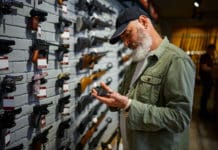With the resolution of the Heller and McDonald cases the Second Amendment and the right to bear arms has been secured as a legal right for every citizen of the United States. Well, apparently not EVERY citizen. Stephen Dearth is a natural born citizen of the United States who chooses to make his primary residence in Canada, making him one of the millions of U.S. Citizens who do not have a permanent residence in the United States. That minor wrinkle means that under U.S. law he cannot purchase a firearm except for “sporting purposes” . . .
As the Heller and McDonald cases have explained, firearms ownership under the Second Amendment is not just for “sporting purposes,” and Mr. Dearth has brought a new case (with some help from our friends at the Second Amendment Foundation) to court to get Mr. Holder to fix the laws to comply with the recent decisions.
Mr. Dearth was visiting some friends in the United States when he decided he wanted to purchase a handgun for self defense. Mr. Dearth already possessed a Utah concealed handgun permit which would enable him to carry it in a number of other states, didn’t meet any of the major disqualifying criteria (felonies, restraining orders, mental health issues, etc), and he was planning on keeping his new purchase at a friend’s house in the States for safe keeping.
As he was filling out the Form 4473 at the gun store, he ran headlong into Question 13 which asked him about his state of residence and stopped him in much the same way a brick wall stops a flying water balloon. He didn’t have any, and according to Federal law if you don’t have a state of residence you don’t have the same Second Amendment rights as the rest of us.
The document filed with the court on November 14th explains the situation in more detail, so here is the “Statement of Facts” section:
1. Federal Restrictions on Expatriated Americans’ Ability to Acquire Firearms. Title 18 U.S.C. § 922(a)(9) provides: “It shall be unlawful – for any person, other than a licensed importer, licensed manufacturer, licensed dealer, or licensed collector, who does not reside in any State to receive any firearms unless such receipt is for lawful sporting purposes.” violation of this section is punishable by fine and/or imprisonment of up to five years. 18 U.S.C. § 924(a)(1)(D). “No person, other than a licensed importer, licensed manufacturer, licensed dealer, or licensed collector, who does not reside in any State shall receive any firearms unless such receipt is for lawful sporting purposes.” 27 C.F.R. § 478.29a. “An individual resides in a State if he or she is present in a State with the intention of making a home in that State.” 27 C.F.R. § 478.11.
Title 18 U.S.C. § 922(b)(3), and 27 C.F.R. §§ 478.96, 478.99, bar a firearms dealer from selling firearms to individuals who do not reside within the state in which the dealer’s place of business is located. An exception to this prohibition allows a dealer to sell rifles and shotguns to residents of states where the dealer does not maintain a place of business, as long as the transaction would be legal “in both states,” that is, the purchaser’s state, and the dealer’s state. By operation of this section, otherwise qualified American citizens wishing to buy firearms cannot do so unless they maintain a residence within the United States. All firearms purchasers within the United States who do not possess a Federal Firearms License, meaning, virtually all ordinary civilian consumers of firearms, must complete “Form 4473, Firearms Transaction Record Part I – Over-The-Counter, OMB 1140-0020,” administered under Defendant’s authority, in order to purchase a firearm. 27 C.F.R. § 478.124. Question 13 on Form 4473 provides, “What is your State of residence (if any)? ____________” The failure to complete Form 4473, including Question 13, voids a firearms transaction.
2. The Challenged Laws’ Impact on Plaintiffs: Plaintiff Stephen Dearth is a natural born citizen of the United States and a resident of Canada. Separate Statement of Undisputed Material Facts (“SUF”) 1. He does not maintain a residence in the United States. SUF 2. Dearth is over the age of 21, is not under indictment, has never been convicted of a felony or misdemeanor crime of domestic violence, is not a fugitive from justice, is not an unlawful user of or addicted to any controlled substance, has not been adjudicated a mental defective or committed to a mental institution, has not been discharged from the Armed Forces under dishonorable conditions, has never renounced his citizenship, and has never been the subject of a restraining order relating to a child or an intimate partner. Dearth holds a valid Utah permit to publicly carry a handgun, which is recognized in numerous states.
Dearth has many friends and relatives in the United States whom he enjoys visiting, and whom he intends to continue visiting on a regular basis. Dearth also travels to the United States on business. SUF 5. Dearth intends to purchase firearms within the United States, which he would store securely at his relatives’ home in Mount Vernon, Ohio, and which he would access for lawful sporting purposes as well as for other purposes, including self-defense, while visiting the United States.
Unaware of the federal restrictions on firearms acquisition by expatriated Americans, Dearth attempted to buy a firearm within the United States on or about January 28, 2006. However, he could not provide a response to Question 13 on Form 4473, and advised the dealer that he does not reside in any state. On account of Dearth’s foreign residence and inability to answer Question 13, the transaction was terminated. Dearth subsequently spoke with an official at the Federal Bureau of Investigations, who confirmed that Dearth could not adequately complete Form 4473, and could not purchase a firearm on account of his lack of domestic residence. Dearth subsequently sought to purchase a firearm within the United States.
Dearth truthfully advised the seller that he did not reside in any state, and on account of that fact, the transaction could not proceed.
Dearth reasonably fears arrest, prosecution, incarceration and/or fine were he to provide false state residence information on a Form 4473 in order to purchase firearms, and cannot purchase firearms at retail if he truthfully declines to list a state of residence on Form 4473. The enforcement of the federal restrictions on firearms acquisition by expatriated Americans is presently interfering with Dearth’s efforts to acquire firearms for self-defense.
It’s an interesting question. Does one have to have a permanent residence of the United States in order to enjoy all the freedoms associated with citizenship? Do you suddenly become a second-class citizen just because your house is located outside the 50 states?
The recent court rulings held that every citizen has a right to posses a firearm for self defense. But in order to exercise that right you need to be able to purchase a firearm (which Federal law prohibits in this case).
The court document provides some downright compelling arguments for changing the current laws due to their apparent unconstitutionality, drawing on not only court cases but quotations from the founding fathers to make the point. Needless to say we’ll be keeping an eye on this case.





So illegal aliens have the right to hold and register arms but citizens living abroad do not? Can the SCOTUS, also known as the US City Council or US Homeowners Association, please further clarify?
No, currently illegal aliens do not have the right to possess firearms.
Question–If the Bill or Rights doesn’t grant someone a right but merely acknowledges the existence of rights granted by either God or Nature–wouldn’t illegal aliens actually have the (natural, inalienable) right to carry weapons for protection? I would say yes they do have that right, even if they are breaking immigration law.
ETA Whoops, I didn’t see there was a whole article down below about this subject. Never mind.
Seems to also have implications for any visit to a state by another state’s resident.
A friend of mine offered this for consideration:
“Funny, too, that the IRS maintains jurisdiction over your personal taxation regardless of domicile. If you lose your 2nd Amendment RIGHTS when you leave the U.S., shouldn’t you also lose your 16th Amendment ILLICIT OBLIGATION to the Treasury as well?”
The US is one of the few countries to tax citizens abroad. In 2003 they modified the laws to grab even more salary than before and of course the SSA Ponzi scheme has applied since the 70s. Many states tax expatriots too and US servicemembers pay tax living overseas while civilians don’t.
When I lived overseas I maintained a home in the US so I could still buy hardware when I visited. This chap needs to work around the system by using a US address as a home of record.
Even though he’s still a US citizen, wouldn’t he be subject to the the laws of the country he lives in?
Or is the question related to US citizens bearing firearms while in the US if their permanent residence is outside the US?
That.
I don’t see why your physical address matters in the NICS check unless it’s denied. With your name and social security number, they Feds can pull up all sorts of things on you, including previous address, car registrations, etc. It was by verifying that info that I was able to get through airport security after I had lost my ID. If it’s denied, and you think wrongfully so, it might be a case where you’re being confused with someone else and your address might help correct that. Otherwise, I don’t think it should be a requirement.
I’ve provided my full SSN for only one 4473, and last four only for one as well. The rest (a majority) have been completed without any need for my SSN.
Having an extremely rare last name helps, as does having two legal middle names.
My LEGAL alien wife can own a weapon (if she would actually start enjoying them as much as me – sorry, tangent).
But the real reason here is simply accountability. The Feds want (need?) a place to trace that weapon back to (residence) should it be used inappropriately. I am not defending it, but pointing to the logical reasons.
Should the gun be used in a crime with no trace-ability AND the owner outside the country – pretty tough to find it and the owner.
I am surprised nobody has brought up the real question – Why is he in Canada? With the wonderful government we have here, I can’t imagine wanting to live in Canada! Even when I lived in Japan and the Philippines, I always had a Home of Record to refer to when purchasing things. There are even issues getting items shipped from Amazon overseas. Heck, iTunes would sometimes block things if it saw you had a foreign IP address or didn’t have a credit card based out of the US. The US also has a very complicated system of Export laws and Export-controlled items.
Regarding tax laws, it really depends on your source of income and what your tax situation is in various countries in determining what you owe Uncle Sam. No two people are the same. Govt. (including military) are subject to taxes yet Contractors are not (up to a certain salary). However, if you are paid by a foreign company, you pay that country’s taxes, not the US, generally speaking.
Why is he in Canada? With the wonderful government we have here, I can’t imagine wanting to live in Canada!
Legally, he can live in Canada and work there. There’s a long history of cross border work between the US and Canada. His rights as a citizen shouldn’t end because of where he lives. Period.
Even when I lived in Japan and the Philippines, I always had a Home of Record to refer to when purchasing things.
The firearms form asks for a “state of residence”. A Home of Record may not legally cover him. I wouldn’t want to be a test case given the potential penalties involved.
Litigation is fine over this issue and the federal form.
I wonder if changing the law may be more effective and quicker? Or, should gun rights supporters want a legal precedent voiding the need for a US address on the form?
Fascinating discussion. I agree that an expat would be subject to the laws of the place he lives, but what if I wanted to buy a gun next time I visit? Would something stop me (assuming I could pass the background check), I mean other than my own moral compass?
You’re not a privileged character. You have to buy your guns from the ATF just like any other furriner.
sorry but this guy IS NOT A RESIDENT OF THR UNITED STATES which is a requirement to buy a firearm IN THIS COUNTRY
what is your state of resident? if you are not a resident of this country then you can not buy a firearm egally here
so he is a US citizen but lives in canada too bad for him
Stephen Dearth is a natural born citizen of the United States who chooses to make his primary residence in Canada, making him one of the millions of U.S. Citizens who do not have a permanent residence in the United States. That minor wrinkle means that under U.S. law he cannot purchase a firearm except for “sporting purposes” . . .
Comments are closed.